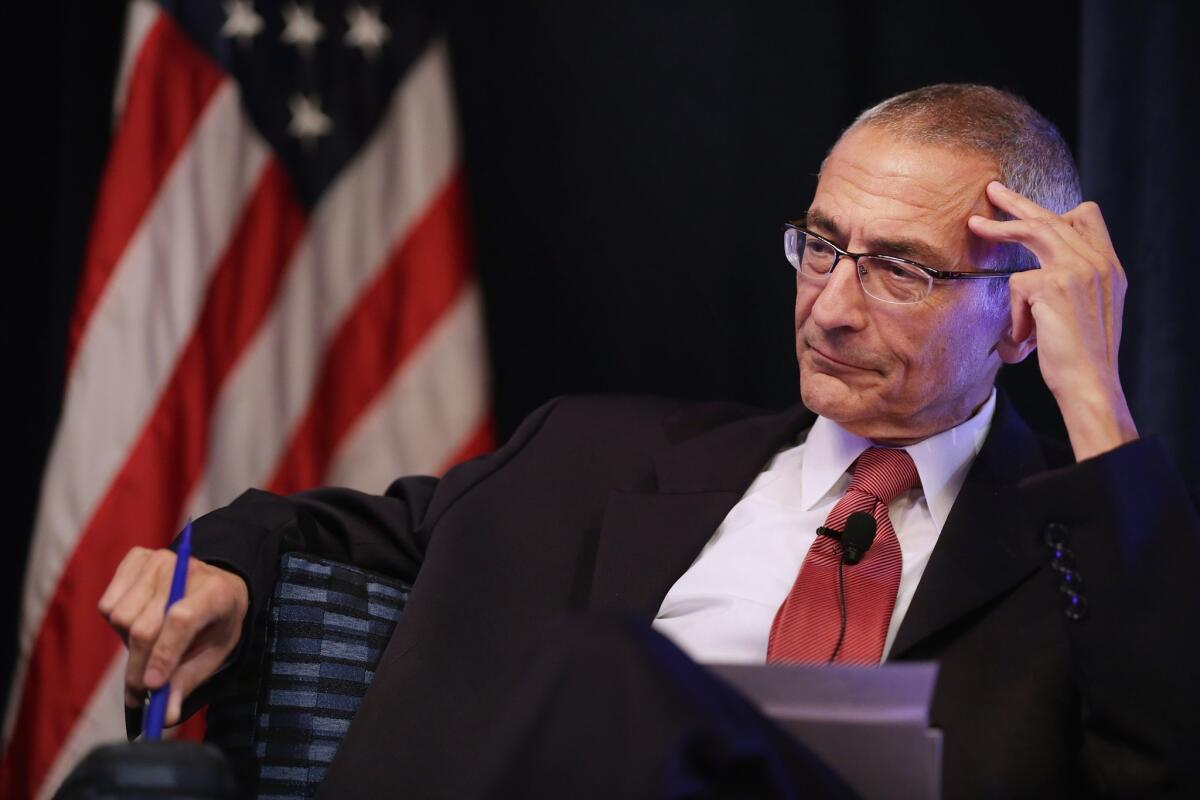White House to review use of Americans’ personal info

- Share via
WASHINGTON – White House advisor John Podesta took on a new role Thursday as the administration’s “big data” point person, launching a sweeping review of how the government and businesses use large caches of personal information – and what effect that has on privacy.
A week after President Obama announced that Podesta would take the lead on the project, Podesta said he would spend the next 90 days looking at the way personal data are collected, stored and analyzed.
“We are undergoing a revolution in the way that information about our purchases, our conversations, our social networks, our movements and even our physical identities are collected, stored, analyzed and used,” Podesta wrote in a blog post kicking off the review. “The immense volume, diversity and potential value of data will have profound implications for privacy, the economy and public policy.”
Podesta’s working group, which includes Secretary of Commerce Penny Pritzker and science and technology advisor John Holdren, will report findings to the president this spring.
Obama commissioned Podesta as he announced a series of reforms to the spy practices of the National Security Agency. Obama said the changes he was ordering were meant to rebuild public trust damaged by the disclosure of such practices as government collection of U.S. telephone call data.
But aides to the president said he also wanted to anticipate potential problems as technological capability grows. After former NSA contractor Edward Snowden began to leak information about spy practices last year, Podesta called for just such a review by a presidential commission.
At the time, Podesta, a former chief of staff under President Clinton, was chairman of the action fund of the Center for American Progress, a progressive think tank that he founded.
The real challenge wasn’t that the NSA was overstepping its legal boundaries, Podesta said at a CAP event in July. “Instead, new products and services, increasing processing power and the decreasing cost of storing huge amounts of data means that surveillance on an unprecedented scale is now not just technologically possible, but it is financially feasible for the first time,” Podesta said, according to a transcript on the CAP website. “It’s past time for us to begin a new national debate about what we want our surveillance laws to permit, particularly in light of how rapidly technology and society are changing.”
Podesta has a long-standing interest in surveillance and privacy, going back to his time in the 1980s working with Sen. Patrick Leahy (D-Vt.) to pass the Electronic Communications Privacy Act, updating wiretap laws in light of new technology. In December, Obama brought Podesta on board at the White House as a counselor on a range of subjects, including privacy issues.
Podesta will explore how industry and government use the linking of large databases of information and how to best protect people’s privacy, according to an official familiar with the plans.
His group will weigh the ideas of civil liberties advocates, technologists and world leaders, as well as concerns from Silicon Valley in the wake of the Snowden revelations. Industry leaders worry about government invasion of their data and systems, and about the impact those disclosures are having on their overseas businesses. Obama has said he wants his team to look into those concerns.
On Thursday, Podesta said he would look at how “public and private sectors can spur innovation and maximize the opportunities and free flow of this information while minimizing the risks to privacy.”
The 90-day review isn’t meant to come up with a comprehensive new policy, Podesta said, but the work will “serve as a foundation” for a plan of action.
Follow Politics Now on Twitter and Facebook
Twitter: @cparsons
More to Read
Sign up for Essential California
The most important California stories and recommendations in your inbox every morning.
You may occasionally receive promotional content from the Los Angeles Times.











